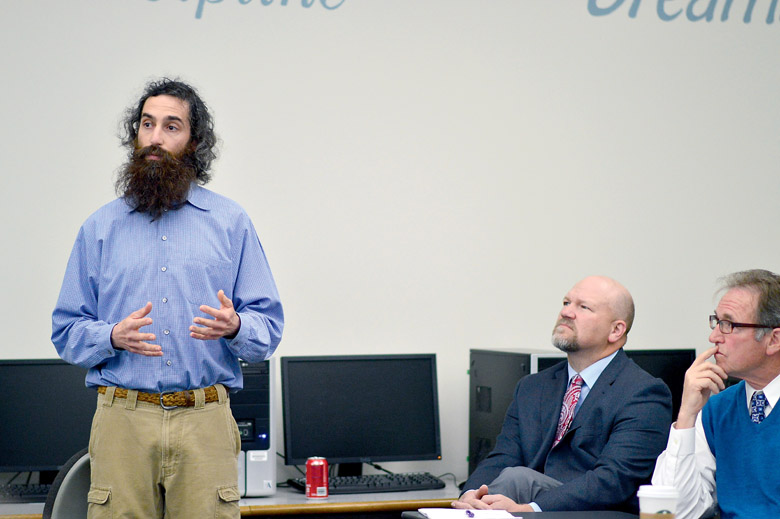PORT ANGELES — The Natural Resources program, what’s known as an “alternative learning experience” at the North Olympic Peninsula Skills Center, is slated for elimination, in part due to funding trouble.
It was to be cut, that is, before a flock of supporters from across Clallam County gathered at Tuesday morning’s meeting of the skills center administrative council.
The council, composed of superintendents from the Sequim, Port Angeles, Cape Flattery, Crescent and Quillayute Valley school districts and skills center director Peggy Templeton, initially barred members of the public and news media from its 9 a.m. meeting at the skills center, 905 W. Ninth St.
“This is a closed meeting,” said Marc Jackson, Port Angeles School District superintendent, before repeatedly asking people to leave the conference room.
Public comment
But Quillayute Valley Superintendent Diana Reaume added that the council simply needed time to figure out how to proceed — and seven minutes later, she called the meeting to order in a much larger classroom.
Some 50 people filed in, and Reaume said the council would shortly hear public comment.
The assembly was a who’s who of the environmentalist community: representatives of the North Olympic Salmon Coalition, NatureBridge, Streamkeepers of Clallam County, Washington State University Extension, staff and volunteers, retired scientists and teachers.
These are the community partners of the Natural Resources program, which began in 2008.
They work with the program’s instructor, Dan Lieberman, to involve students in environmental projects: sea bird surveys, beach cleanups, Olympic National Park studies, tree planting along the Dungeness River and other efforts from Sequim to the West End.
State requirements
But the Natural Resources program does not seem to meet state requirements for skills center courses, Templeton said.
Courses must attract enough students to garner the state funds to cover the costs of the instructor.
They must also provide 500 hours of instruction inside and outside the classroom.
The skills center has been operating at a deficit, Templeton added, because it does not have the full-time equivalent enrollment numbers it must.
Lieberman, however, reported that the Natural Resources program has 20 full-time-equivalent students, which meets the skills center’s funding needs.
But that number contradicted Templeton’s: She said the program has just 14 FTEs.
Lieberman noted that her figure doesn’t include six students in the skills center’s advanced-level course titled “Natural Resources Options.”
“I don’t want to argue with you, Dan,” Templeton said.
Jackson brought up another issue: The courses require a teacher with a “highly qualified” certification, something Lieberman doesn’t yet hold.
But because the Natural Resources program is categorized as career and technical education — CTE — it does not carry that requirement, Lieberman responded.
Yet another question arose: Are the Natural Resources students spending the required portion of their time in the classroom with their instructor?
All of these issues can be resolved by contacting the state Office of the Superintendent of Public Instruction, said Reaume, so that is what she and the council will do.
Then the skills center administrative council can decide the fate of the Natural Resources program — and determine whether Lieberman is laid off.
State law requires that if a program’s enrollment numbers aren’t high enough for the coming school year, its teacher or teachers must receive layoff notices by May 15, Templeton said in an interview after the meeting.
Decision upcoming
Templeton expects a decision on the Natural Resources program at the administrative council’s next meeting at 1 p.m. next Wednesday, May 6 at the skills center.
The decision will be made, she said, using the state’s answers to the legal and financial questions.
At Tuesday’s meeting, 20 people spoke up — to applause, again and again — in praise of Lieberman’s program.
They included Jeff Ward, a recently retired Pacific Northwest National Laboratory scientist who said that at the end of his career, he realized how crucial it is to train the next generation.
“Working with these young people, teaching them about the environment,” he said, “is incredibly important.”
This program is open to students all over the county, added Ed Chadd, who is manager of Streamkeepers of Clallam County but spoke instead as an individual.
“The partnerships that have been created” with environmental agencies are invaluable ones, Chadd said.
“You have an amazing resource here. Do not lose this resource.”
Lois Danks, a retired prison educator, added a comment about funding for Natural Resources students.
“You can spend it now,” she said, “or you can spend a lot more later” on incarceration.
________
Features Editor Diane Urbani de la Paz can be reached at 360-452-2345, ext. 5062, or at diane.urbani@peninsuladailynews.com.

